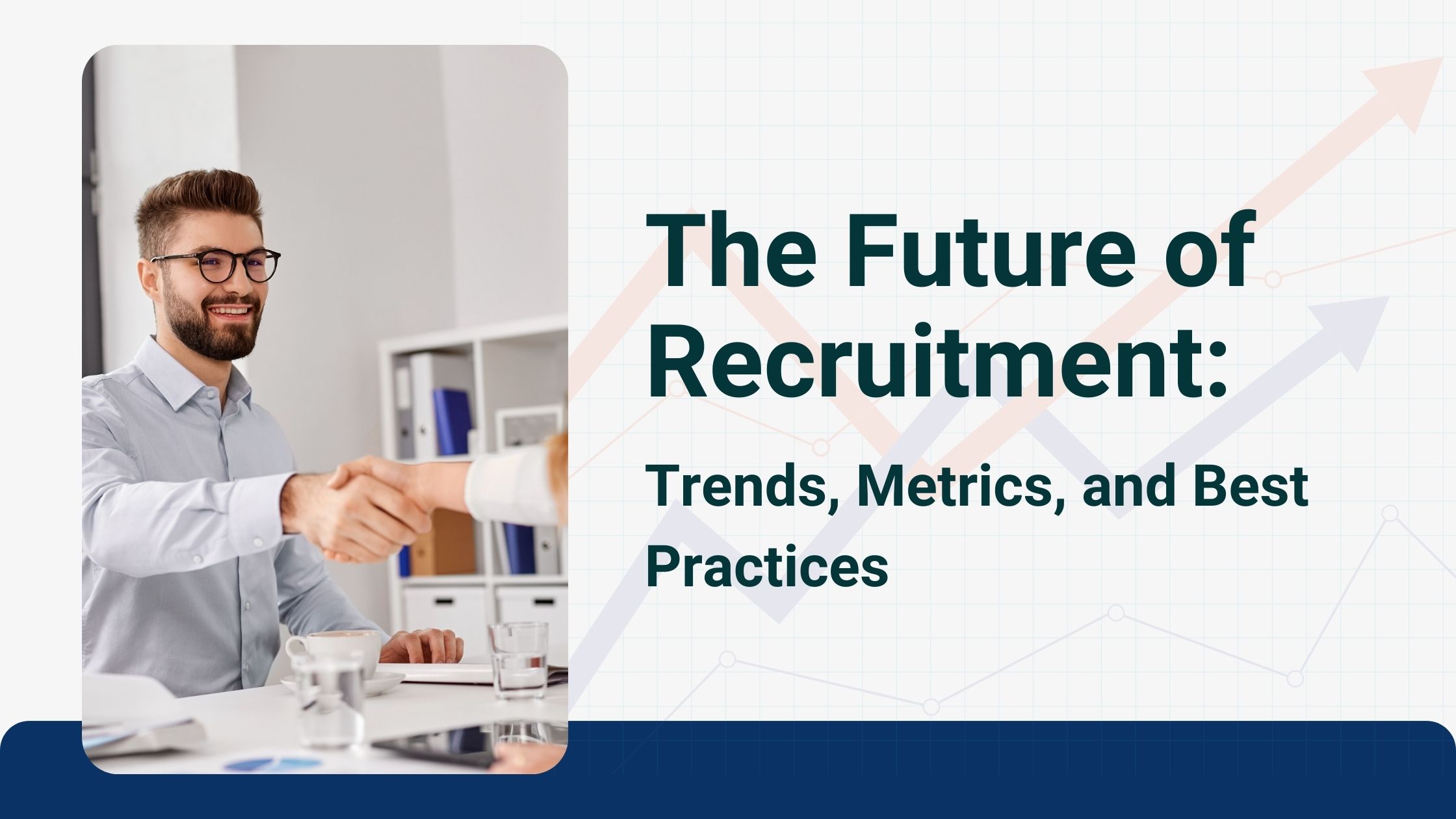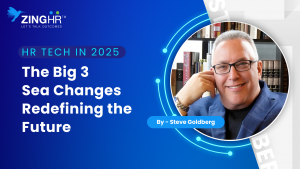In a world of rapid technological change and shifting workforce demographics recruitment has never been more dynamic.
Each year new tools, strategies and approaches emerge to help companies to attract, assess and onboard talent.
As we look to it’s clear this will only continue. From AI-driven hiring processes to inclusive and diverse talent strategies the recruitment world is evolving to meet the demands of a fast-paced, digitally connected world.
This guide covers the top recruitment trends in 2025 so HR professionals, recruiters and business leaders can get ahead.
Whether you’re adapting to hybrid work models, using neuromarketing to engage Gen Z candidates or enhancing your employer brand to understanding these trends will be essential.
At ZingHR, with over 20 years of experience, we have seen first-hand how AI, automation and data-driven insights are changing the hiring landscape for businesses across industries.
Let’s get into the emerging trends and opportunities in the recruitment landscape that will shape your hiring trends in 2025.
Table of Contents:
Why are Hiring Trends Important?
14 Recruitment Trends for 2025
- Artificial Intelligence (AI) in Recruitment
- Virtual Recruitment and Remote Hiring Technologies
- Traditional vs. Skill-Specific Hiring Approaches
- Succession Planning in Recruitment
- Diversity, Equity, and Inclusion (DEI) Initiatives
- Employer Branding as a Recruitment Tool
- Chatbots in Recruitment
- HR Software with AI Integration
- Industry-Agnostic Hiring Practices
- Social Hiring and Employee Advocacy
- Engaging Gen Z Employees
- Neuromarketing in Recruitment
- Hybrid Work Module
- Leadership Development Strategies
The Future of Recruitment
How to Adapt to These Trends as a Recruiter
FAQ’s
In conclusion
Importance of Staying Updated on Recruitment Trends
In today’s highly competitive job market, staying updated on recruitment trends is no longer optional; it is crucial.
The hiring process and candidate expectations are changing fast and if you don’t adapt you’ll left behind.
Recruitment trends aren’t just trends they’re a reflection of the way the workforce and workplaces are changing. As new technology, generations and economic factors shaping recruitment companies that keep up will be the ones that attract and retain the best talent.
As we look to 2025, companies will stand for adopting trends like AI recruitment, skill-based hiring, and a stronger focus on DEI initiatives. Those who adopt these, not only streamline their hiring process but also increase employee retention & satisfaction.
Recruitment Trends for 2025
Here are some recruitment trends that HR professionals and recruiters can get ahead of.
1. Artificial Intelligence (AI) in Recruitment
AI is no longer futuristic concept;
it is here and changing the recruitment trends. By 2025 AI will be at the heart of streamlining recruitment, making it more efficient and data-driven techniques.
AI can automate tasks such as resume screening, candidate matching, skills filtration and interview scheduling.
Our Recruitment 2.0 platform uses AI to recruit the top 1% of employees. Through AI analytics ZingHR helps businesses to assess candidate fit and potential within the organization based on industry-agnostic hiring, skills, experience and behavioral indicators.
By using AI tech we help companies reduce hiring time, improve hiring accuracy and ensure top talent doesn’t slip through the cracks.
For example, ZingHR’s platform can auto-match candidates to open roles by analyzing job descriptions and candidate experience, reducing the manual effort of going through applications.
This AI approach has been beneficial for companies looking to scale quickly or fill roles with particular skill requirements.
According to Ideal, organisations using AI in recruitment saw a 30% reduction in time and cost to hire.
Example: A large multinational company like Unilever uses AI-powered video interviews where a candidate facial expressions and word choices are analyzed to predict job fit.
2. Virtual Recruitment and Remote Hiring Technologies
The shift to remote work has changed how organisations approach recruitment. Virtual recruitment is no longer a temporary fix; it’s becoming the new norm. By 2025 companies will be relying more and more on virtual recruitment tools to connect with candidates.
Platforms like Zoom and Microsoft Teams have become the go-to’s for interviews, allowing companies to expand their talent pool beyond geographical boundaries. Companies are also adopting virtual assessment tools that simulate real work scenarios so candidates can show off their skills.
A Gartner study found that 82% of company leaders plan to allow employees to work from home at least part of the time post-pandemic. So recruitment strategies need to adapt to this new world.
Example: Microsoft went fully virtual with video interview platforms like Microsoft Teams and Zoom.
3. Traditional vs. Skill-Specific Hiring Approaches
As the job market develops, traditional hiring practices focus on degrees and previous job titles are becoming less relevant. By 2025, organisations will be adopting skill-based hiring, not credentials.
The World Economic Forum estimates that 50% of all employees need reskilling by 2025. Recruiters need to focus on candidate’s skills and competencies rather than their educational background.
Example: Google moved from degree-based hiring to skill-based hiring for certain roles. They prioritise technical skills and problem-solving over degrees, especially for software development roles where coding assessments and logic tests trump academic qualifications.
4. Succession Planning in Recruitment
Succession planning is often overlooked in recruitment strategies but it’s crucial for long-term organisational success. Companies will be prioritising succession planning as part of their recruitment process. This means identifying and developing future leaders from within the organisation and also external talent.
In our own experience working with many clients and HR teams, we’ve seen how a strong succession plan can make a great impact.
One of our clients faced a sudden leadership departure, but because they had our succession planning module, they could seamlessly transform responsibilities to an internal candidate who was already familiar with the organization’s goals, ethics and culture.
According to a Harvard Business Review study organisations with effective succession planning are 2.5 times more likely to have strong leadership and overall performance. This isn’t just about preparing for future challenges but also boosts employee morale and engagement.
Example: IBM does succession planning by identifying internal talent for leadership roles. Using predictive analytics they identify employees with leadership potential and offer them targeted training programs.
5. Diversity, Equity, and Inclusion (DEI) Initiatives
Diversity, equity and inclusion are now part of the recruitment strategy. By 2025 companies will be expected to have concrete DEI initiatives in place and candidates will be actively looking for employers that put these values first.
According to McKinsey, companies in the top quartile for gender diversity are 25% more likely to be above-average profitable. Companies with more diverse leadership teams are 33% more likely to outperform their peers.
Example: Accenture has committed to 50% women in their global workforce by 2025. To achieve this they’ve removed bias from job descriptions, inclusive language in recruitment materials and structured interview processes to avoid unconscious bias.
6. Employer Branding as a Recruitment Tool
In a competitive market, employer branding is key to attracting top talent. By 2025 companies that invest in building their employer brand will have a big advantage in recruitment trends.
A Glassdoor survey found 84% of job seekers consider a company’s reputation before applying. So organisations must actively manage their brand by showing their work culture, values, ethics and employee experiences.
Example: HubSpot build their employer brand through employee testimonials and company culture videos on LinkedIn and Glassdoor.
7. Chatbots in Recruitment
Chatbots are becoming a part of the recruitment trends, it is improving candidate experience and communication. By 2025 organisations will use chatbots to engage with candidates at various stages of the hiring process.
Chatbots can answer FAQs, schedule interviews and provide updates on application status, making the recruitment process more efficient.
According to a Phenom study, companies using AI chatbots in recruitment have seen a 50% reduction in candidate drop-off.
Example: L’Oréal uses a recruitment chatbot called “Mya” to engage with candidates throughout the hiring process. The bot answers common candidate questions, schedules interviews and provides status updates, reducing the recruiter’s workload.
8. HR Software with AI Integration
By 2025, AI with HR Software will be crucial in recruitment. These systems will help organisations to manage their recruitment process better, analyse data and make informed decisions.
AI-integrated HR software can help with candidate sourcing, tracking applicant progress and data-driven insights into recruitment strategies. According to a Deloitte analysis, organisations that use data analytics in HR are five times more likely to make better decisions in the hiring process.
Example: ZingHR use AI-driven HR software to automate recruitment tasks, track applicant progress and provide predictive hiring insights.

9. Industry-Agnostic Hiring Practices
Organisations are moving towards industry-agnostic hiring. They will start to focus on identifying candidate’s capability and potential rather than their previous industry-specific experience.
For example, Project managers, data analysis, and customer services are valuable job positions in many industries like tech, healthcare, finance etc. Agnostic hiring focuses on skills, so, organisations can expand their search for qualified candidates and find people who may excel in a role even if they don’t have industry-specific experience.
A World Economic Forum report says skills are becoming more important than industry experience, especially in tech where change happens so fast and requires adaptability.
Example: Tesla hires industry agnostic by looking outside of the automotive industry to recruit engineers and technologists from software, energy and other unrelated sectors.
10. Social Hiring and Employee Advocacy
Social media is playing a bigger role in recruitment trends and by 2025 social hiring will be the norm. Companies are using LinkedIn, Twitter and Instagram to reach candidates where they spend their time.
Employee advocacy programs where employees share job openings and company culture on their social media channels are becoming more popular. According to Career Arc, 79% of job seekers use social media in their job search.
Example: Dell lets employees become brand ambassadors by encouraging them to share job openings and company news on LinkedIn, Facebook and Twitter.
11. Engaging Gen Z Employees
As Gen Z enters the workforce companies need to adapt their recruitment strategies to engage this new generation of talent. By 2025 companies will need to focus on flexibility, purpose and technology to attract and retain Gen Z employees.
PwC research found 88% of Gen Z employees want flexible working arrangements and 77% want their employers to focus on mental health and wellness. This generation also values technology and expects employers to use digital tools throughout the recruitment process.
Example1: boAt aligns with Gen Z by being associated with pop culture, music and lifestyle – areas that resonate with younger demographics.
Example 2: Zomato promotes its employee wellness programs, flexible work options and transparent communication channels. Zomato’s quirky and relatable social media presence also makes it an aspirational workplace for Gen Z.
12. Neuromarketing in Recruitment
Organisations will be using neuromarketing techniques to enhance candidate engagement and decision-making. These techniques look at how candidates respond to certain stimuli so recruiters can craft more attractive job descriptions and employer branding strategies.
Research shows visual content can have a big impact on candidate engagement, with studies showing visuals are processed 60,000 times faster than text. By using neuromarketing insights recruiters can create job postings that resonate with candidates on a deeper level.
Example: Johnson & Johnson use “experience-driven job previews” on their career site. Instead of traditional job descriptions, they showcase immersive video experiences where candidates see real employees sharing their stories, daily work routines and the company’s mission. This activates the emotional centres of the brain, two key motivators for job seekers.
13. Hybrid Work Module
The rise of hybrid work models has fundamentally changed candidate expectations regarding work culture. Organisations must prioritise flexibility and adaptability in their recruitment process. Candidates want jobs that allow them to work from home and in the office.
A PwC survey found 78% of employees want to work in a hybrid model post-pandemic. If you don’t offer this flexibility you’ll lose top talent to your competitors.
Example: Amazon introduced a hybrid work policy where corporate employees can work 3 days in the office and 2 days remotely.
14. Leadership Development Strategies
Leadership is key to navigating the recruitment maze. By 2025 organisations will be investing more in leadership development to grow strong leaders who will drive recruitment and retention.
A Gallup study found that companies with engaged employees see a 21% increase in productivity and 41% reduction in absenteeism. By developing leadership skills you can create a more supportive and engaging work environment that attracts the best talent.
Example: PepsiCo has the “PepsiCo Leadership Development Program” (LDP) for internal talent development. By identifying high-potential employees early they nurture them through mentorship, executive coaching and cross-functional projects to prepare them for senior leadership roles.
The Future of Recruitment: Integrating Technology and Human Touch
As we approach 2025 the future of recruitment is about balancing the power of technology with the unbeatable value of human connection. While AI driven screening, virtual recruitment tools and chatbots are changing the recruitment trends there’s an increasing need to keep it human centric. This mixture of tech and personalisation is key to streamlining the recruitment process and making candidates feel seen and heard.
Technology brings efficiency and accuracy, quickly narrow down candidates, analysing skills and finding top talent. However candidates want real interactions and a genuine connection with their future employer.
Personalised recruitment can make a big difference to a candidate’s experience, showing the company culture and building trust. Balancing tech with human touchpoints – like personalised interview feedback or live chat – makes for an efficient and empathetic recruitment process.
How to Adapt to These Trends as a Recruiter
1. Stay up to Date on Technology
Staying updated is the key for modern recruiters. Look out for opportunities to learn and adopt new recruitment tools and software. Also, get familiar with AI driven platforms, applicant tracking systems (ATS) and virtual interview tools.
Subscribe to industry newsletters, attend webinars and workshops to stay up to date with the latest recruitment trends.
Online resources like LinkedIn Learning and Coursera have courses on specific tools that can add to your skill set.
2. Invest in DEI Training
Understanding and implementing diversity, equity and inclusion (DEI) practices is crucial for today’s recruiters.
Doing DEI training will help you recognize unconscious biases and learn how to create an inclusive workplace. Look into programs offered by organizations like SHRM or the Diversity and Inclusion Certificate program from Cornell University.
Join online DEI communities to get valuable insights and shared experiences from other professionals in the industry.
3. Prioritize Soft Skills and Cultural Fit
As a recruiter, you have the ability to assess a candidate’s interpersonal skills, adaptability and alignment with company values is invaluable.
Use behavioural interview strategies to see how candidates handle real life scenarios. Emphasizing these employee skills in the recruitment process not only ensures a better fit for your organization but also highlights the values you bring as a recruiter.
FAQ’s
1. How do I measure the success of my recruitment strategies?
To measure recruitment success, focus on crucial performance indicators (KPIs) like time-to-hire, cost-per-hire, and quality of hire.
Time-to-hire measures the duration from posting a job to fulfill the job position.
Cost-per-hire analyzes expenses, including advertising and recruiter costs, highlighting budget management.
Quality of hire assesses new employee performance and retention rates and indicates alignment with role requirements.
Tracking these metrics regularly helps determine which strategies are working and where improvements are needed.
2. What are common pitfalls to avoid in recruitment measurement?
A few common pitfalls include over-relying on metrics, neglecting candidate feedback, and not aligning KPIs with long-term company goals.
Relying solely on time-to-hire, for example, can lead to rushed decisions that compromise quality. Ignoring candidate feedback can also mean missing insights into the recruitment experience, which is key to improvement.
Finally, ensure that recruitment KPIs support broader objectives like retention and company culture to avoid a short-sighted approach.
3. How can I improve candidate experience during the recruitment process?
Improving candidate experience starts with clear communication and timely updates. Regularly inform candidates about their status and provide feedback after interviews to make them feel valued.
Simplify the application process to avoid lengthy forms, and use tools like chatbots for quick responses to common questions. You can do personal interactions whenever possible—send a thank-you note or provide insights about the company culture goes a long way in making candidates feel engaged and respected throughout the process.
In conclusion
As businesses navigate the dynamic terrain of Recruitment Trends 2025, adapting to these emerging trends is essential for staying ahead of the competition in the talent market.
By prudent use of technology, by adopting diversity and inclusion practices, by considering skill-based hiring, by image building, and by enhancing the overall candidate experience, organisations can hope to become employers of choice and attract top talent in the evolving manpower landscape of 2025.




